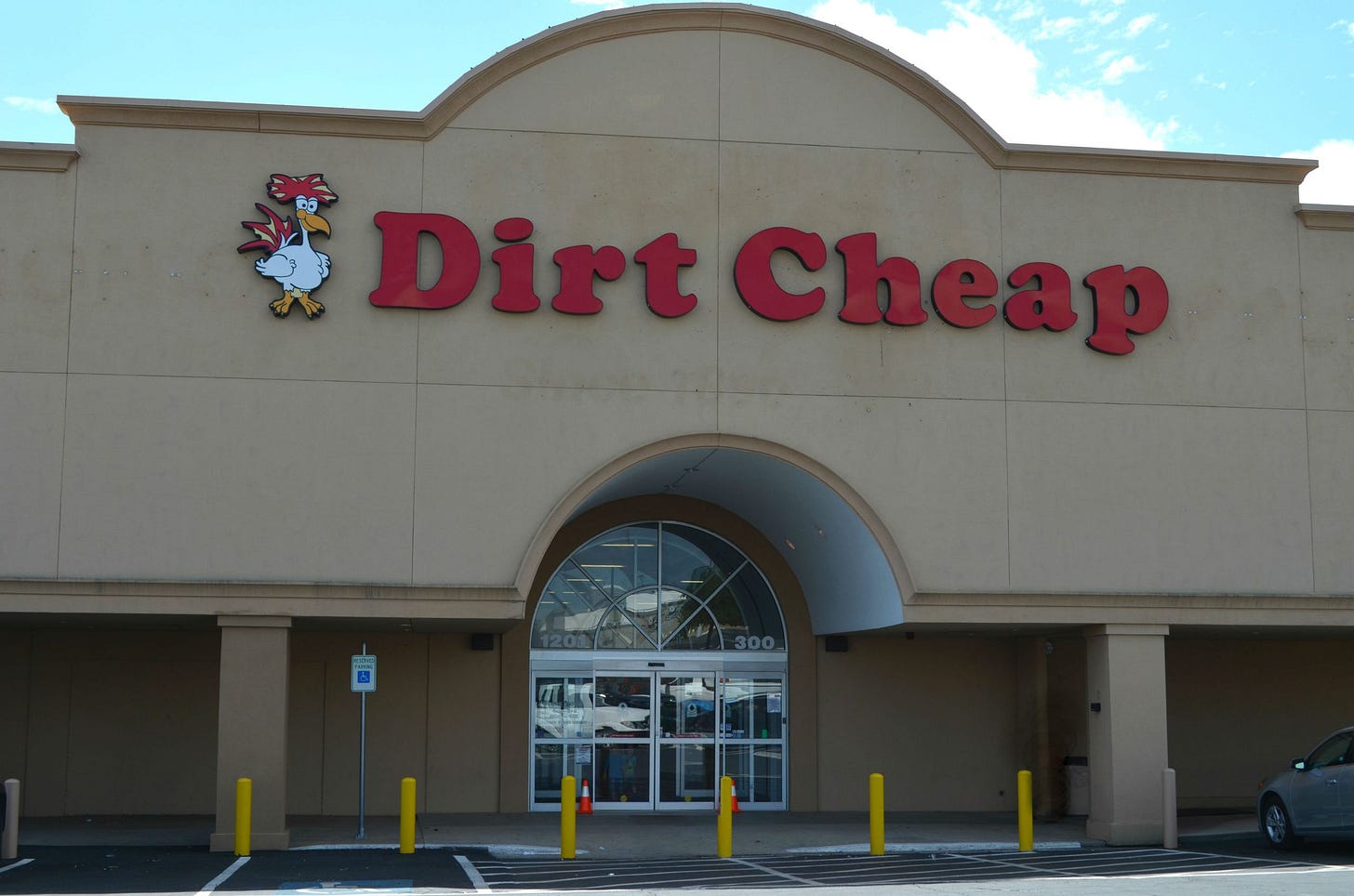💥(Accu)Ride or Die💥
Plus: Dirt Cheap, Virgin Galactic Holdings Inc. ($SPCE), Hawaiian Electric Industries Inc. ($HE)
💥New Chapter 11 Bankruptcy + CCAA - Accuride Corporation💥
Everything old is new again. Gen X darling Pearl Jam (“PJ”) is out on the road touring and Coldplay is out with a new album — one that its lead singer Chris Martin says will be the band’s last and we’ve never prayed …
… for a statement to be more accurate.
Of the two bands, our very own Johnny Dumas prefers PJ and he recommends PJ’s cover “Last Kiss” as your background music for this reading.
Why? It’s about a fatal car accident and nothing screams car crash like Crestview Partners-owned wheel manufacturer and supplier Accuride Corporation …
… which is back in bankruptcy almost fifteen years to the day after previously visiting our cute little industry.* On October 9, 2024, it and 15 affiliates (collectively, the “debtors”) filed chapter 11 bankruptcy cases in the District of Delaware (Judge Stickles).** Between this sucker and Wheel Pros, the smell of burnt rubber (and cash) is infesting bankruptcy courts these days.
Why is yet another auto supplier — in this case, to the medium and heavy-duty commercial truck and trailer markets — in bankruptcy? Anyone want to pause and take a guess before reading on?
Well …
… if you guessed COVID-19, give yourself a pat on the back. The long arm of the pandemic reaches out to claim another victim! Per the first day declaration of CRO Chuck Moore of Alvarez & Marsal LLC (“A&M”):
The Debtors have faced significant headwinds from the lingering effects of the COVID-19 pandemic on the Debtors’ business, operational difficulties, business integration challenges, inflation, supply chain disruption, and other geopolitical and macroeconomic forces that depressed revenue and increased costs. The COVID-19 pandemic left the Debtors reeling, with the sudden seizure of commercial transportation (other than essential goods and services) driving softness in the commercial vehicle market compounded by long-term elevation in labor and materials costs. During and after the pandemic, operational and business integration challenges at certain non-Debtor affiliates required capital support from the Debtors.
Absolutely nothing new here folks. Nor anything original about this either:***
Then, as inflation swelled beginning in 2021, the Federal Reserve reacted by raising interest rates to the highest level seen in decades. This sea change in the global macroeconomic environment contributed to a major decrease in demand for imports and finished manufactured goods; this caused a resulting depression in the freight industry and knock-on effects on freight vehicle manufacturing, which comprises an irreplaceable portion of the Debtors’ customer base. On top of these challenges, Russia’s invasion of Ukraine, and the resultant sanctions regimes against the Russian Federation, left the Debtors unable to access cash at their non-Debtor Russian affiliate—a business that was otherwise an operational bright spot.
It was time to break out the playbook.
The debtors kickstarted an operational restructuring to reduce costs and extend liquidity runway. That’s code for f*cking over vendors. The debtors also started divesting assets. No doubt Mr. Moore was turning over a couch cushion for spare change. Alas, it didn’t matter. By summer ‘24, the debtors had to engage an ad hoc group of consenting first lien lenders and consider strategic alternatives, including a pre-petition sale and marketing process. Enter Perella Weinberg Partners ($PWP)(“PWP”). Given that this sucker is now in bankruptcy, it’s clear that none of the interest was robust enough to make the term lenders happy. Or, as the debtors put it, “…the existing bids have not generated sufficient value to present an attractive opportunity to transact.” Word salad, anyone?
Let’s talk about that debt. The debtors’ capital structure looks like this:
What you see there, at least with Amendments 14-16, is an awful lot of pre-DIP DIP or “bridge financing” tacked on to the original term loans. Which also explains the proposed DIP in these cases: it is a $103mm headline number but that is comprised of only $30mm of new money and a roll-up of $73mm (which comports with the bridge financing amounts). The amount of cash infused into this business pre-filing suggests another reason for the filing: the ad hoc group of consenting term lenders were sick of shoveling money into this thing without the protections afforded to financings under chapter 11 (read: section 364 super-priority status). The debtors seek the complete roll-up on an interim basis along with $20mm of the new money. Fees include a 5% PIK upfront fee, a 2% exit fee, and certain backstop fees to Jefferies Capital Services LLC, as fronting lender.
Indeed! The DIP also contained an interesting 10% “sale premium” feature in the event that the debtors sell all of their assets (or equity). The premium would apply to both the new money and roll-up amounts so we’re talking roughly $10mm for doing … looks 👉, looks 👈 … not entirely sure, frankly, 🤷♀️. We’ll come back to this seeming-backdoor-breakup-fee in a hot sec.
So, now that this thing is in bankruptcy and we know there’s new money coming in, what are the debtors hoping to achieve while in chapter?
Well, speaking of playbooks, middle market specialist Kirkland & Ellis LLP (“Kirkland”)(😉) is company counsel here.**** And so, in typical Kirkland fashion, we have a restructuring support agreement (“RSA”). The RSA contemplates (i) the ABL revolving facility remaining in place (and riding through the cases)***** and (ii) an equitization of the term loan subject to a sale toggle should any potential buyer come forward offering “…sufficient value to present an attractive opportunity to transact.” In addition to agreeing to the equitization, the consenting term loan lenders have agreed to a $128mm takeback DIP-to-exit loan ($112mm) which would include $15mm of new money (distributed pursuant to a debt rights offering)(the backstopping DIP lenders also get an equity kicker such that, in the end, they’ll end up with more equity than term lenders who weren’t part of the ad hoc group).
What about general unsecured creditors? Well, here comes their recovery:
With one catch. The critical vendor motion here is pretty robust; it consists of ~$12mm to be paid on an interim basis and another ~$8mm on a final basis. In other words, its 67% of the new money DIP.
What’s in line for Crestview’s equity? C’mon now, that’s a trick question fools! Clearly with GUCs getting a big fat 🍩, Crestview stands to as well.******
The DIP requires a confirmed plan of reorganization memorializing the terms of the RSA within 95 days of the petition date.
At a first day hearing held on October 11, 2024, the debtors obtained their requested relief. They did not, however, get approval of that funky sale premium. Indeed, prior to the hearing, the debtors submitted a revised order indicating the following:
Notwithstanding anything to the contrary in the Motion, this Interim Order or the DIP Documents, the Exit Fee (as defined in the DIP Credit Agreement) and the Sale Premium (as defined in the DIP Credit Agreement) are not being approved pursuant to this Interim Order and shall only be approved in accordance with a Final Order granting such relief.
We reckon an official committee of unsecured creditors (“UCC”) may have something to say about it. After all, the UCC isn’t going to have much to work with under this case construct.
As noted, the debtors are represented by Kirkland as legal counsel (Ryan Blaine Bennett, Alexander McCammon, Derek Hunter) along with Young Conaway Stargatt & Taylor LLP (Joseph Barry, Kenneth Enos, Jared Kochenash, Andrew Mark) as local counsel — a pairing you don’t see everyday. A&M is financial advisor and providing the debtors’ their CRO (the aforementioned Mr. Moore) while PWP (Alexander Svoyskiy) is investment banker. The ad hoc group of term lenders is represented by Weil Gotshal & Manges LLP (Matthew Barr, David Griffiths, F. Gavin Andrews) and Richards Layton & Finger PA (Zachary Shapiro) as legal counsel — which just goes to show that Eaton Vance isn’t in every single credit on planet earth and Gibson Dunn & Crutcher LLP doesn’t have 100% market share of ad hoc groups, just 99.9%, 😜. There’s a special committee of the board involved here too, featuring frequent independent director Steven Panagos (formerly of Moelis) and Ted Stenger (formerly of AlixPartners LLP … welcome to the party pal); they’re investigating … like … stuff (while advised by counsel selected from “a slate of law firms acceptable to the Consenting Term Loan Lenders” … something that must have those firms who frequently get BoD referrals from Kirkland a little nervous). Crestview Partners is represented by Paul Weiss Rifkind Wharton & Garrison LLP (Paul Basta, Jacob Adlerstein, Xu Pang) and Klehr Harrison Harvey Branzburg LLP (Domenic Pacitti, Sally Veghte)
*It previously filed for bankruptcy on October 8, 2009, also in the District of Delaware (Judge Shannon).
**There’s also a CCAA here for a Canadian affiliate.
***This bit, however, was different and interesting and has a bit of a political undercurrent to it:
On June 20, 2024, one of the Debtors’ competitors, Webb Wheel Products, Inc. (“Webb”), filed petitions against the imports of certain brake drums from the People’s Republic of China and the Republic of Türkiye alleging that brake drums from these countries were being sold in the United States at less than full value. The net impact of these petitions on the Debtors’ business remains to be seen. Debtor KIC, LLC, purchases brake drums from certain Chinese manufacturing partners. Antidumping and countervailing duties, if imposed, would significantly increase the cost of Wheel Ends’ imported products. At the same time, Debtor Gunite, LLC may face increased demand for its domestic production capacity for wheel end products. The uncertainty resulting from the outstanding petitions filed by Webb appear to have contributed to discouraging potential acquirers of Wheel Ends from transacting at a price that would be profitable for the Debtors (net of projected wind-down and exit costs).
****We’re not poking fun at Kirkland here; rather, we’re indirectly providing commentary about where the supermajority of chapter 11 bankruptcy deals are these days. The dearth of volume necessitates a “drop down” of the likes of Kirkland (and A&M) to keep bodies busy and mouths fed. There are a lot of high-priced firms involved here for a capital structure of this size, that’s an objective fact.
*****Notably, the ABL lenders took some paydown from the bridge financing to de-risk exposure.
******Subject to the directors’ “investigation,” lol, they’ll get releases from liability.
💥New Chapter 11 Bankruptcy - HDC Holdings II LLC (Channel Control Merchants LLC)💥

On October 10, 2024, Mississippi-based HDC Holdings II LLC (the “Company”) and 18 affiliates (collectively, the “debtors”) filed chapter 11 bankruptcy cases in the District of Delaware (Judge Horan). The debtors are vertically-integrated reverse logistics solutions providers; they “…procure and process secondary merchandise, including excess inventory and customer returns, from major retailers and sell the products through the Company’s retail stores directly to customers and through wholesale channels to other off-price retailers or e-tailers.”
Right, here goes in English: basically the debtors are a discount retailer that buys the scraps from other retailers and sells them through its brick and mortar locations — locations like Dirt Cheap, Dirt Cheap Building Supplies, and Treasure Hunt. Wait…
Yes, these places are actually real. Lol, has there been any other company more aptly named to swirl around the bankruptcy bin?? No, we’ve definitely peaked with this one. Like, just take a look at the logos:
The mascots are out of a cancelled season of Sesame Street where the characters discover crack cocaine.
The debtors were founded in 1954 as a logistics solution provider with a retail arm. By ‘15, KKR & Co Inc. bought the business, with the previous owners retaining a minority stake. Maybe by now you’re thinking, “is this another PE + brick and mortar horror story?” Yes, yes it is. Apparently KKR ran the thing so poorly that the minority equity holders sued KKR in September ‘23, alleging fraud and gross negligence on the part of the PE firm.
“The complaint outlines a deliberate attempt by the defendants to intentionally make false and material misleading statements through the company's 2019 financials by overstating inventory values in order to conceal the fraud and mismanagement of the company. These actions ultimately led to the company restructuring the plaintiff's equity value to pennies on the dollar. The plaintiffs have sued for a financial amount of damages to be determined at trial.”
By then KKR had already sold the business to a group of private investors that included Hilco Global (“Hilco”) and Behrens Investment Group (“Behrens”) in May ‘23. Hilco and Behrens didn’t do much better.
Here’s CRO, Jeffrey Martin, explaining a supplier issue the debtors faced:
“The Company has recently encountered multiple issues with its foundational supplier, Target Brands, Inc. (“Target”). Over the past eighteen (18) months, Target has de-mixed its pallets, divesting its best returns to B-Stock Solutions, Inc., a Company competitor. At the same time, Target has been channeling a deteriorating mix of inventory to the Debtors, while increasing the cost of its pallets. Given Target’s position as the Company’s foundational supplier, the Company lacked the necessary leverage to negotiate or otherwise dispute these increased costs.”
eBay Inc. ($EBAY) alum, Howard Rosenburg, founded competitor B-Stock Solutions, Inc. in ‘08. In stark contrast to the debtors, B-Stock seems to run an extensive online marketplace. Retailers like Target Corp. ($TGT) probably realized that what they were getting for its liquidation goods from B-Stock was markedly higher versus what the debtors offered. We’re sure part of that is due to lower operating expenses on the side of B-Stock.
And here’s Mr. Martin’s unoriginal spiel on the struggles of a brick and mortar business:
“Retail companies that have a significant or exclusive brick-and-mortar presence, like the Debtors, bear higher expenses than web-based retailers and are heavily dependent on store traffic, which has decreased significantly as consumers increasingly shop online. Other macro-economic factors have further compounded the problems plaguing retailers. For instance, changes in consumer spending habits have necessitated many retailers to increase promotional activities and discounting, leading to thinner profit margins. Onerous brick-and-mortar lease terms and increased operating costs, during a period of downturn in the retail sector and deep discounting, have intensified retail losses. Indeed, these macro-economic challenges have compelled numerous national retailers to file chapter 11 cases in recent years, including Big Lots, Conn’s, Rue21, Express, and The Body Shop, among others.”
Wow, that’s quite a list. Where might you be able to learn more about all the other brick and mortar retail bankruptcies? Oh, right. Here’s our Big Lots Inc. coverage, our Conn’s Inc. coverage, our New rue21 Holdco, Inc. coverage, and our Express Inc. coverage.
By mid ‘24, the debtors were burning up to $1mm in cash per week; they also lost their line of credit. Hilco ended up pumping in $15mm as equity and the debtors also obtained a $5mm FILO loan. Nevertheless, the debtors’ liquidity was drying up quickly, inevitably leading to a pivot towards chapter 11 bankruptcy filings.
The debtors brought on Hilco Merchant Resources LLC as liquidation agent and started winding down the business. We’re hoping someone “acqui-hires” the debtors’ social media person:
But wait a minute, isn’t Hilco the majority equity holder of the debtors? And doesn’t Hilco have representatives at three of the six board seats? Yes and yes. So basically the debtors want an affiliate of an insider to conduct the going out of business sales, 🤔.
As you can imagine, the newly empowered U.S. Trustee (“UST”) had objections; it wanted to punt the debtors’ proposed going out of business motion to a later date to have more time to dig into the possible legal issues and to allow time for the formation of a committee of unsecured creditors (“UCC”). In response, the debtors warned of “immediate and irreparable harm” (of course) and “catastrophic consequences” if the store closing sales motion was not granted on an interim basis. Oh and here’s the kicker: Hilco will be performing the services FOR FREE without any fees.*
Was free work — free work in bankruptcy, 🤯 — enough to satisfy the UST’s concerns? Here’s Judge Horan on the issue:
“I also think it’s significant that Hilco Merchant Resources is not being paid for its work.”
“If we were in here with a proposed fee, I think we might be having a - there’ll be a different analysis.”
So yes, the store closing sales motion got approved on an interim basis.
The debtors are coming in with a prepetition ABL facility of $29.5mm, a second lien loan of $4mm, and a $10.5mm mortgage loan from Hancock Whitney Bank. That’s a total of ~$44mm worth of prepetition secured debt. There’s also ~$32mm of unsecured obligations.
Parties will convene for a second day hearing on November 7, 2024 at 11am ET so we’ll see if there’s any additional issues with the Hilco agent agreement.
The debtors are represented by Young Conaway Stargatt & Taylor LLP (Michael Nestor, Andrew Magaziner, S. Alexander Faris) as legal counsel, Mosaic Growth Partners (Jeffrey Martin) as financial advisor, and Hilco Merchant Resources LLC (Ian S. Fredericks) as liquidation agent. BMO Bank NA is represented by Vedder Price PC (Michael Schein, Jacqueline Carlson) and Womble Bond Dickinson US LLP (Matthew Ward) as legal counsel. Hancock Whitney Bank is represented by Faegre Drinker Biddle & Reath LLP (Brett D. Fallon, Patrick A. Jackson) and Carver Darden Koretzky Tessier Finn Blossman & Areaux LLC (David F. Waguespack, Elizabeth Griffin) as legal counsel.
*There will still be expense reimbursements for Hilco.
🚀One To Watch: Virgin Galactic Holdings Inc. ($SPCE)🚀
So this is probably the “SPAC”-iest deSPAC that ever did deSPAC.
Keep reading with a 7-day free trial
Subscribe to PETITION to keep reading this post and get 7 days of free access to the full post archives.












